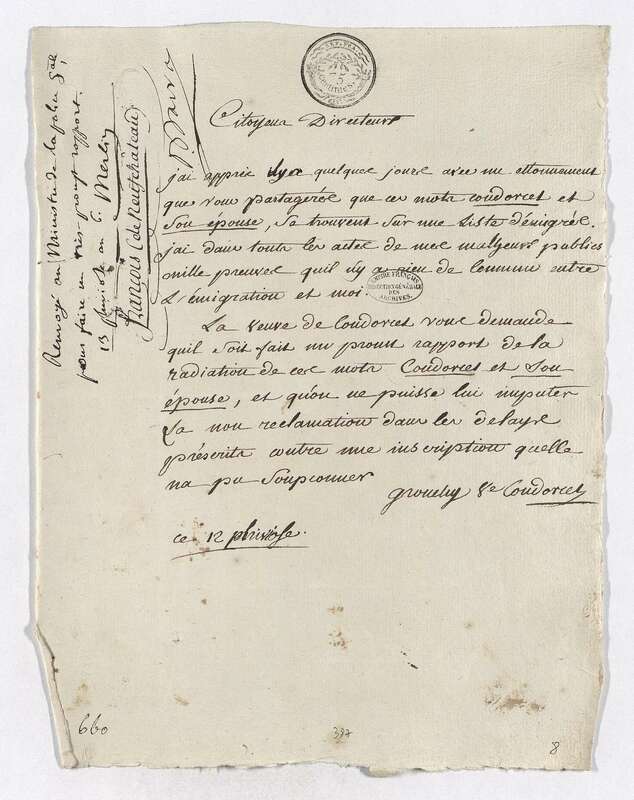|
On 12 Pluviose, An VI, or 31 January 1798, Sophie de Grouchy wrote a letter asking for her name and that of her deceased husband to be struck off a register of the French people who had emigrated during the Revolution. Being on that list meant that all of one’s property could be confiscated. At that time Sophie was struggling to make ends meet for herself and her extended family. Their names had been added to that list after Condorcet’s disappearance, following his being proclaimed an outlaw. Because Condorcet was in hiding, and because his death went unreported for several months, it was assumed that he’d left the country. On the other hand, Sophie had officially divorced him, and she was a registered occupant of a house in Auteuil, where she been nearly arrested on more than one occasion. In the letter, Sophie stated that she could provide ample evidence for the fact that neither she nor Condorcet had left the country. She submitted 13 pieces, including certificates of her residence in Auteuil, a passport for her to travel to Villette to visit her father, and a report on the death of Condorcet. Sophie’s letter was then forwarded to the Minister of the Police so that he could make a very prompt report.
The report was indeed prompt – the decision is dated two days later - but it was not succinct: and the same dossier containing Sophie’s letter, also has several lengthy documents detailing the request that hers and Condorcet’s name be taken off the list. The decision states that there is no need to call forward witnesses (she had provided a long list, with Cabanis listed first) and that the presence of Grouchy and Condorcet’s names on the list was clearly a consequence of the persecution Condorcet had been subjected to during the Terror. It must have helped that the Directoire was in power at the time of her request, the government in which her friends, the ideologues, played an important role. It’s also likely that this was how she eventually found out that the reason she could not reclaim her or Condorcet’s property was that they were listed as immigrants, and therefore, in debt to the government. Sophie’s bout of poverty is what led her, according to her daughter, to publish her translation of Adam Smith, the translation to which she appended her letters. So without this particular injustice, we may never have known the Letters on Sympathy.
0 Comments
Leave a Reply. |
About
This is where I live blog about my new book project, an intellectual biography of three French Revolutionary women philosophers. Categories
All
Archives
November 2022
|

 RSS Feed
RSS Feed